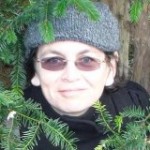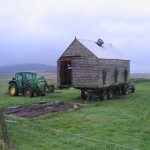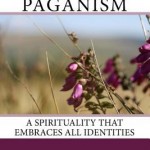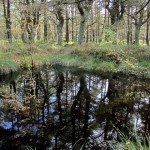My theology class this fall at Cherry Hill Seminary is wrapping up this week, and my students are making their closing remarks and evaluating each others’ final projects. I love to see the gratitude and delight my students express at the end of the semester—sometimes to me, but more often, to each other.
I design my classes to be discussion-oriented and as non-hierarchical as a graded class can be. As an instructor, what I provide is structure—readings, theoretical frameworks, vocabulary. The real learning takes place when my students enter that structure: they struggle together, question and challenge each other, hear each other’s stories, and bear witness to each other’s epiphanies. Deep understanding grows most naturally in a community of intellectual and emotional support.
There’s a myth that scholars work alone, tucked away in libraries or at computers. It’s true, when I’m on a writing marathon, I tend to forget the rest of the world. But the thoughts that I write down so avidly rarely come to me when I’m alone. Most often, they develop in classrooms, in intimate conversations with friends, or over breakfast with my long-suffering husband (who, surprisingly, is not yet sick to death of listening to me talk about religion). The best scholarship is collaborative.
I feel greatly blessed by the community of Pagan studies scholars who gather every year at the American Academy of Religion conference. I’ve had opportunities to present my work there and receive feedback, but the most enriching parts have always been the intense debates over coffee, the casual dinners where a dozen people or more laughingly cram themselves around a too-small dinner table, and the brilliant extracurriculars organized by locals. This year, religion and performance scholar Jason Winslade put together an amazing “Occult Chicago” pre-conference. The pre-conference brought incoming scholars and local practitioners together for presentations, conversation, and a wonderful piece of occult steampunk theater. I find myself going back to the AAR conference year after year, not for the massive book exhibit or the keynote addresses, but for the company, the encouragement, and the warm mentoring I receive.
I’ll let you in on an open secret: most Pagan studies scholars are Pagan themselves. Not all study the same Pagan traditions they practice, and many study contemporary Paganism as a sidebar to some broader discipline, which provides paying work (sociology, for instance, or the religions of a particular region of the world). There’s a myth going around that scholars who study Paganism are somehow hostile to the movement, that their historical studies are meant to undermine the religion or destroy it. Nothing could be further from the truth. We do often disagree, though: not all scholars of Paganism (or Pagans in general) share the same vision for our movement or have exactly the same values. That’s as it should be.
Pagan scholars who are Pagan themselves are in a slightly strange position, academically speaking: they’re “insiders” to certain Pagan traditions, “outsiders” to others. An entire book, in fact, has been published just to talk about participant-observer methods and insider/outsider positioning in Paganism (Researching Paganisms). The insider-outsider spectrum is complex, and deserves its own post… as does the difference between religious studies, which traditionally uses an “outsider” method, and theology, which by definition is written by insiders. But more on that another day.
I’ll continue to unpack that complicated question of “What is theology?” (because it is not the same as religious studies!) in a later post. Today, I’m content to celebrate the warm communities of scholars I have access to, and also to invite you to join some of them.
In the spring, I’ll be teaching “Paganism and the Body” as an online course at Cherry Hill Seminary. It is a Master’s-level course that requires some previous training in theology or religious studies, but don’t despair if you’re not there yet—I plan to teach it every few years. Here’s the description:
Declaring that all acts of love and pleasure are the rituals of the Goddess, contemporary Pagans widely affirm the sacredness of the body and of sexuality. Students will engage with the-logical and ethical writings around gender, sexuality, and the body from Pagan and allied perspectives, such as Christian and post-Christian feminist and queer theologies. Special attention will be given to Pagan understandings of same-sex relationships, BDSM, polyamory, transgender, and other expressions of gender and sexuality that are marginalized by mainstream society. The role of gender polarity and sex magic in the Western esoteric tradition and its influences on religious witchcraft will also be considered. Students will examine their conceptions of gender and sexuality and develop their own the-logies of the body in a context that takes both personal liberation and social justice into account. Students will also consider the challenges and joys of ministering to a sexually diverse Pagan community and emerge better equipped to counsel their communities in ethical responsibilities around eroticism and touch.
Mine is not the only class available by far, though – in addition to the Master’s classes, there are also 4-week community classes for those looking for a smaller commitment. Click here for descriptions.
Also, Cherry Hill Seminary is holding an exciting conference on sacred places in April, with Ronald Hutton as keynote speaker! Paper proposals are being welcomed through January 1:
We welcome papers that explore the following questions:
In today’s post-modern, urbanized world, where everything is a commodity, how and where do Pagans find their sacred places? How should we protect and maintain these sites? In colonized worlds, how do we avoid the appropriation of these lands? If Goddess is immanent in nature, what makes some places more sacred than others? How is our spirituality shaped by the land and our relationship with the land shaped by our spirituality?
Proposals of up to 1000 words are due by January 1, 2013 and may be uploaded at http://www.cherryhillseminary.org/blog/announcements/call-for-papers/
The best scholarship happens in community. Won’t you join the conversation?

















